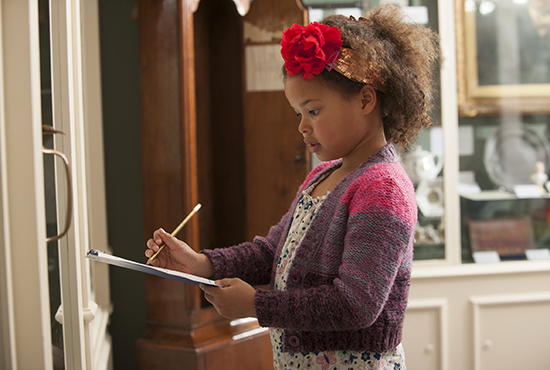Art & Design curriculum links
Art & Design curriculum links across all four national curricula can be found near the beginning of every Superpower of Looking lesson resource.
Cross-curricular links
There are many ways in which the Superpower of Looking resource connects with other areas of the national curricula. You may like to use the lesson resources below to connect with the following subjects:
English
A lady, a curse and tales of King Arthur
Geography
History
Pop Art planes inspired by comics
Queen Elizabeth I and the Spanish Armada
Hogarth pokes fun at corrupt Georgian MPs
Mathematics
David Hockney paints his parents
Music
Many of the resources have suggestions of music in the 'Everyone learning' section to complement the artworks.

PSHE / Health and wellbeing
Vincent van Gogh, a selfie and a bandaged ear
Children in a busy hospital ward
See also the PSHE / CfE Health and Wellbeing section below
Religious and moral education
The three wise men who visited Jesus
Science
Rachel Ruysch's flowers and insects
Social studies
Hogarth pokes fun at corrupt Georgian MPs
Technologies (Food)
As a whole, The Superpower of Looking also supports the non-statutory programme for Citizenship (KS2) by supporting pupils to:
- talk and write about their opinions, explaining their views on issues that affect themselves and society
- recognise their worth as individuals by identifying positive things about themselves and their achievements, seeing their mistakes, making amends and setting personal goals
- research, discuss and debate topical issues, problems and events
- reflect on spiritual, moral, social and cultural issues, using imagination to understand other people's experiences
PSHE / CfE Health and Wellbeing
Additionally, in a broader context, The Superpower of Looking provides opportunities to connect with many elements of PSHE teaching, and with Health and Wellbeing E&Os in Scotland.
The following are a selection of examples of how the images in The Superpower of Looking can be used to explore core themes and learning opportunities outlined in the 2020 Programme of Study for PSHE Education at KS2 level:
Health and Wellbeing
H5. about what good physical health means; how to recognise early signs of physical illness
H6. about what constitutes a healthy diet; how to plan healthy meals; benefits to health and wellbeing of eating nutritionally rich foods; risks associated with not eating a healthy diet including obesity and tooth decay.
H15. that mental health, just like physical health, is part of daily life; the importance of taking care of mental health
H23. about change and loss, including death, and how these can affect feelings; ways of expressing and managing grief and bereavement
H25. about personal identity; what contributes to who we are (e.g. ethnicity, family, gender, faith, culture, hobbies, likes/dislikes)
- Lubaina Himid's portrait of a tailor
- Queen Elizabeth I and the Spanish Armada
- David Hockney paints his parents
- Vincent van Gogh, a selfie and a bandaged ear
H27. to recognise their individuality and personal qualities
- Lubaina Himid's portrait of a tailor
- Queen Elizabeth I and the Spanish Armada
- David Hockney paints his parents
- Vincent van Gogh, a selfie and a bandaged ear
Relationships
R1. to recognise that there are different types of relationships (e.g. friendships, family relationships, romantic relationships, online relationships)
R3. about marriage and civil partnership as a legal declaration of commitment made by two adults who love and care for each other, which is intended to be lifelong
R8. to recognise other shared characteristics of healthy family life, including commitment, care, spending time together; being there for each other in times of difficulty
R13. the importance of seeking support if feeling lonely or excluded
R34. how to discuss and debate topical issues, respect other people's point of view and constructively challenge those they disagree with
- In-class discussion throughout all lessons
- Hogarth pokes fun at corrupt Georgian MPs
Living in the Wider World
L5. ways of carrying out shared responsibilities for protecting the environment in school and at home; how everyday choices can affect the environment (e.g. reducing, reusing, recycling; food choices)
L9. about stereotypes; how they can negatively influence behaviours and attitudes towards others; strategies for challenging stereotypes
- A lady, a curse and tales of King Arthur
- Lubaina Himid's portrait of a tailor
- A girl scrubbing pots and pans by Chardin
L11. recognise ways in which the internet and social media can be used both positively and negatively
L16. about how text and images in the media and on social media can be manipulated or invented; strategies to evaluate the reliability of sources and identify misinformation
- Queen Elizabeth I and the Spanish Armada (use as propaganda)
L24. to identify the ways that money can impact on people's feelings and emotions
- The three wise men who visited Jesus
- Queen Elizabeth I and the Spanish Armada
- David Hockney paints his parents
- Hogarth pokes fun at corrupt Georgian MPs
L26. that there is a broad range of different jobs/careers that people can have; that people often have more than one career/type of job during their life
L27. about stereotypes in the workplace and that a person's career aspirations should not be limited by them